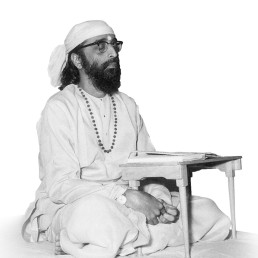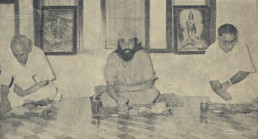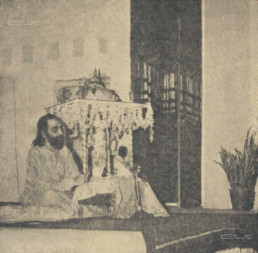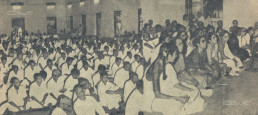
Jnana Yajna 73

Year & Dates:
September 03, 1960 to September 24, 1960

Yajna Topic:
Shrimad Bhagavad Gita- Chapter 2

Place:
Kozhikode, India.
Kozhikode, which had the fortune of hosting Pujya Gurudev’s 9th Jnana Yajna on Aitareya Upanishad as early as in March 1955, had to wait more than five long years for His next Jnana Yajna in its beautiful coastal surroundings. When Pujya Gurudev agreed to conduct His 73rd Jnana Yajna there on the overarching second chapter of Shrimad Bhagavad Gita, the people were exuberant.
Pujya Gurudev arrived at Kozhikode on the auspicious tenth day of Onam that year, on September 3, 1960. The whole of Kerala was in a festive spirit after a bountiful harvest as it welcomed the New Year as per the Malayalam calendar. Marking the return of Mahabali, the great devotee of Mahavishnu who surrendered to the Vamana Avatara, Onam is well-known for its Pookkalam (rangolis of flowers) and the sumptuous feast called Onam Sadya. To have Pujya Gurudev share the Onam Sadya was indeed a joyful honor.
With Love and Time For All
After a happy inauguration on the evening of September 3rd, the Gita Jnana Yajna began in full earnest in the large Hall of Sri Narayana Guru before another enthusiastic congregation of seekers. Every evening, half an hour before Pujya Gurudev’s main discourse in English, Miss. Parukutty, the secretary of the yajna committee, gave a synopsis of the previous evening’s discourse in Malayalam. Braving the heavy rains, the audience attended the yajna to listen to Pujya Gurudev expound on the verses that sketched the ‘Yoga of Action, the ‘Path of Love,’ and the ‘Path of Renunciation’ as presented in a glorious synthesis of the Sankhya Yoga of the exemplary chapter 2 of the Gita.
The morning discourses on Atma Bodha were held in another venue called the Besant Hall. Because of the inclement weather and Pujya Gurudev’s ill-health, the features of the Laksharchana and the yatra had to be canceled. However, the people of Kozhikode enjoyed an extra day on September 25th with Pujya Gurudev as He delivered a civic address that evening before leaving to Guruvayoor enroute to Ernakulam.
By 1960, Pujya Gurudev’s schedule was packed and showed no signs of letting up. In the few days between two successive Jnana Yajnas, Pujya Gurudev had made it a practice to complete important activities overseeing the growing wings of the Mission as well as monitoring the preparations for the upcoming Sandeepany Sadhanalaya in Mumbai. Thus, in that precious window of time after the 73rd yajna, Pujya Gurudev made the trip to Ernakulam to visit Kochu Narayani Amma, the aunt who raised Balakrishna Menon and whom Pujya Gurudev revered as His mother.
The way the frail Kochu Narayani Amma embraced the commanding sage and how Pujya Gurudev responded with playful banter to her anxious enquiries about His health warmed the hearts of all the devotees in Ernakulam. Pujya Gurudev spread much cheer in that home and refreshed His mother’s spirits. He enquired about the wellbeing of those who clamored for His attention, caring equally for the ordinary and the influential. In that trip to Ernakulam, Pujya Gurudev kindly encouraged His dear, young devotees of the Chinmaya Balavihar group, reveling in their delightful stories and Gita chanting. He also blessed a Kathakali performance with His presence. Effortless was His love that He gave so abundantly wherever He went.
Photo Gallery

“Think,” Says Pujya Gurudev
The Transcendental Truth can be explained only in terms of the limited and the finite or else the students, who have no experience of the beyond, will not be able to conceive of or apprehend the Absolute and the Eternal. When a traveler in a distant clime discovers a beautiful bird of wondrous plumage, when he comes back to his own native land, in order to explain the beauty which he saw, he will have to talk to his friends in terms of the birds’ plumage that are native to folks of his native land. The unseen is explained always in terms of the seen, and thereby the unknown becomes fully indicated rather than defined; for, any unknown quantum merely defined in itself is as unknown as without the definition.
Similarly, here the Changeless, Immutable Self is being described by Lord Krishna in terms of the mutable and ever-changing world which is very familiar to Arjuna and all people like us. In the world-of-change objects come to their annihilation either through instruments of death or are consumed by fire or destroyed by water or dried up by air. These are the various means and methods by which the objects of the world come to their destruction. All these means are declared as impotent in bringing about the destruction of the Self.
From Tyagi Magazine
Watch Your Words!
Effective communication requires sensitivity to the audience’s reaction and understanding. A lack of empathy leads to disconnect and repels others, causing unhappiness and unrest. True mastery lies in remaining unperturbed by external influences, withdrawing from attachment effortlessly like a tortoise retracting into its shell at the hint of danger.


